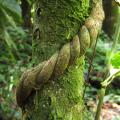
DMT-Nexus member
Posts: 127 Joined: 08-Nov-2020 Last visit: 08-Nov-2024 Location: Canada
|
Greetings, I have been spending a lot of time on reddit as of late most specifically in the r/dmt section (as well as the lab and changa subs). I have been recovering from a surgery and in bed for the last 6 weeks. I am finding the number of people seeking public attention for their dmt experiences overwhelming. I stopped reading trip reports awhile ago, and mostly hung around to give help or advice to people with technical difficulties with vaping, extracting, making vape carts ect. I felt like a bit of a public service and got to know a few decent people who also try to help (mostly mods). I also got the opportunity to learn from others who had greater knowledge than myself. I made the mistake of viewing part of a posting about a trip report (made on youtube) in which the experiencer claimed to have had their ego crushed and destroyed. Quite a frothy and emotional video which I found quite sad and delusional. Why would someone with no ego feel the need to make a public admission of the fact that their ego was destroyed? On youtube no less. There was even a section where the experiencer holds the camera up to their eyes and says "see you can still see the teers". I made the mistake of writing briefly about how I felt if an ego is crushed it doesn't need to be made public as this is highly personal, and the fact the poster felt the need to make it public demostrated the ego was still there and obviously intact. This of course left the door open to about 18 hours of derisive trolling and various inflammatory comments towards me. In the end it more or less caused me a lot of negativity and I decided to simply walk away and delete my comments. I am finding the need to "cash in" on the DMT experience whether emotionally (ie attention) or financially or simply to increase the person's views on youtube very contradictory to what this spiritual experience is about. I am pretty old school so also fairly private. It baffles my mind why anyone would want to combine publicity with the spiritual experience. As the maturity level of this site is obviously high I am interested if anyone can give me any feedback positive or negative please. If anyone is from reddit I would appreciate to not be trolled obviously. thanks in advance if you made it through that. EDIT: For the record Im not trying to play victim here. I definitely was vocal with people exponentially giving back what I was receiving. "I think; therefore I might be."
|
|
|
|
|

DMT-Nexus member

Posts: 1538 Joined: 24-Nov-2009 Last visit: 31-Aug-2024
|
I recently encountered this guy who considered himself something like an ego death evangelical. He's been publicly trying to organize an open zoom room for people to come and smoke DMT together on social media. He's also been proselytizing about how you don't need to use a scale.  There seem to be a lot of very young people in those reddit spaces. Some of them are open to learning about how to be safer, to protect themselves and to protect access to the medicine. Sometimes I reach out and try to help (publicly or privately) if I am up for it. But, some others double down, at which point it's obvious they are raging narcissists looking to cash in on a social media following, and they will continue to disrespect whatever substances, communities, and spirituality it takes to get there. It's not about helping people, it's about exploiting anything for shock value, and not caring at all who gets thrown in harm's way. I really dislike those cringy clickbait psychedelic reaction videos, too. Fortunately, none of it seems too popular. Hopefully it stays that way, and the people who want to exploit things for clicks move on the next big fad... Some things will come easy, some will be a test
|
|
|

My Personalized Tag
Posts: 464 Joined: 10-Nov-2019 Last visit: 17-Apr-2024
|
I see your point, but I don't think that this exploitation of the DMT experience comes from a place of malice or self-centeredness. Monkey see, monkey do, as it were—when we discover something new and exciting we are eager to share it with the tribe, so to speak. On an unconscious level the ego has some part in that, but so does genuine good will. When I first discovered the molecule... well, I was hesitant to say anything at all, save to one person. But as time went on, I explained in detail my experiences and what they brought to me in detail to all I thought would listen earnestly. I was careful not to push it on anyone, and though a part of me did want to share in the euphoria with another person, I have not succeeded in turning anyone onto actually using DMT. Probably this is because I was so modest and restrained. It's the sensational stories that bring people in and that brought ME in, almost two years ago now. But then, those stories give unrealistic expectations and disappointing experiences. Pros and cons I guess. One thing I can't stand is psychedelic meme accounts on instagram. Those should be scourged from the face of the earth. Claiming to do good by spreading awareness, while only perpetuating the very attitudes that create stigma in the first place  I don't want comfort. I want God, I want poetry, I want real danger, I want freedom, I want goodness. I want a clever signature.
|
|
|

DMT-Nexus member

Posts: 1538 Joined: 24-Nov-2009 Last visit: 31-Aug-2024
|
There's nothing wrong with curiosity, and conversations have to start somewhere. I mean my jimmies get rustled when people start making plans to live film themselves smoking DMT over social media, and use social media to encourage others to join them, because they think it will make them famous like Joe Rogan. That is dubious in so many ways, and could ruin someone's life. Some things will come easy, some will be a test
|
|
|

DMT-Nexus member
Posts: 127 Joined: 08-Nov-2020 Last visit: 08-Nov-2024 Location: Canada
|
Thanks for both the alternate perspectives. Im grateful for a voice of sanity here. I think I was taking the whole thing personally, although being lambasted may have that effect on a person. Especially important to remember the "monkey see" nature of the hairless ape culture (myself included) and also the "age factor". "I think; therefore I might be."
|
|
|

DMT-Nexus member

Posts: 1538 Joined: 24-Nov-2009 Last visit: 31-Aug-2024
|
When I first started drinking Ayahuasca, the first time a close friend saw me tripping, he was really concerned, and he said it scared him to see me like that. I wasn't having a meltdown or anything, I was just hanging out in the common area under a blanket. He said I didn't look well. That experience always sat with me in a deep way and served as a kind of reality check. People who have never had an intense psychedelic experience may form judgments about psychedelics based on how they see other people behaving on them. This could harm interpersonal relationships, create negative impressions about psychedelics, or at the extreme end, bring legal consequences if something garners a ton of negative attention. Everyone who shares these medicines is interconnected, and we have to all look out for each other. Sometimes going bananas and turning into a grunting, slobbering ape is part of the healing process, but that's why it's so important to secure a safe set and setting ahead of time. One time I shared changa with a friend. She proceeded to rip off her shirt, started screaming, and tried to crawl under the sofa like she was stuck in a loop after breaking through. She was completely dissociated and had no idea what happened, no idea why her shirt was off or that she spent the entire time trying to crawl under the sofa. This was my only experience sitting for someone who went totally out of control. When she came down, she said the Mayans explained their calendar.  I wasn't scared because I know what it's like to be there, and that you always come back. We were 100% physically safe, set and setting were good - but for someone who has never *been there,* I understand how witnessing someone so dissolved or out of control would be terrifying. That's why tiktoking etc. those moments isn't doing anyone any favors. It's handing ammo to everyone who wants to draw and quarter people in the name of war on drugs. I don't think MOST of the people oversharing have bad intentions. Video-based communication is culturally second nature for a lot of younger people now. Often people are open to considering some oldschool caution if you frame it in a nonconfrontational way. Everyone wins with caution, because it helps secure a safe future where everyone still has access to sacred molecules. And who doesn't love sacred molecules, right?  Ego attachments to one's perceptions of ego death experiences are  part of the learning process maybe. I laughed pretty hard when an article about "spiritual narcissism" went up, and half of the comments about the article were wildly defensive. 100% I've been high on my own BS before, too. Sometimes I will engage in no-win arguments with people who are being deliberately exploitative, solely for the fact that other people silently reading the conversation might reflect or gain something from it. My engagement isn't for the person who needs the ego check, but for other people who could be harmed by believing them, or by imitating a behavior that could be harmful because no one (like younger me before my friend) ever made them think otherwise. Like hey, maybe I have something to gain by keeping this a little more private. The internet needs all the psychedelic elders it can get. The way western culture has demonized psychedelics has created all of these holes in society where people are desperate to experience their higher selves, but lack the guidance for how to safely explore, share and integrate properly. The erosion of privacy has a weird role in what is "acceptable" to share and what isn't, too. Your future employer can always search for you.  There is a happy ending to the story - my friend who was initially freaked out seeing me that time eventually found his way to hyperspace, and now has a studio making psychedelic art.  Some things will come easy, some will be a test
|
|
|

DMT-Nexus member
Posts: 1111 Joined: 18-Feb-2017 Last visit: 12-Jul-2024
|
grimlid wrote:It baffles my mind why anyone would want to combine publicity with the spiritual experience. The spiritual experience is just an experience that anyone can have; spiritual wisdom comes with time. It's understandable that when someone is new to it and has a powerful experience, they're excited and want to share it. I'm not in the dmt subreddit, but I see the same among the people I know from the aya circles I'm involved in. People who are new are often vocal on Facebook, post about their experiences and share every article on psychedelics they come across. But many of those with more experience don't even mention anything psychedelic-related (safety being one reason, but not the only one). This can also be seen in the post-ceremony sharing circles. With time, people gain a different perspective. Attention shifts from the experience itself to living a better life, being a better person, helping others etc. Let's give them a decade or two and not forget where we come from 
|
|
|

DMT-Nexus member
Posts: 91 Joined: 03-Mar-2009 Last visit: 08-Feb-2026 Location: USA
|
I can't help but browse the DMT subreddit. There can be good art posted there. I do find it aggravating quite often as well, however. There are a lot of people in there recommending irresponsible things or making unsubstantiated claims. To the users who post productive trip reports, I always thank them for sharing, and to the users who speak out with rumor or unsafe advice, I simply "downvote" and refrain from commenting as best I can.
The DMT subreddit is scary because it showcases how young many users of DMT are and sadly, the amount of people who are doing psychedelics when they are not in the proper mental state. Yet I suppose that is to be expected for one of the largest social media websites on the internet... If only the nexus were as busy as the DMT subreddit, that would be great.
|
|
|

DMT-Nexus member
Posts: 127 Joined: 08-Nov-2020 Last visit: 08-Nov-2024 Location: Canada
|
SLANE wrote:I can't help but browse the DMT subreddit. There can be good art posted there. I do find it aggravating quite often as well, however. There are a lot of people in there recommending irresponsible things or making unsubstantiated claims. To the users who post productive trip reports, I always thank them for sharing, and to the users who speak out with rumor or unsafe advice, I simply "downvote" and refrain from commenting as best I can.
The DMT subreddit is scary because it showcases how young many users of DMT are and sadly, the amount of people who are doing psychedelics when they are not in the proper mental state. Yet I suppose that is to be expected for one of the largest social media websites on the internet... If only the nexus were as busy as the DMT subreddit, that would be great. I agree with everything you say there. I do enjoy the art also. Its lack of a DMT-Nexus phone app is likely part of the reason, though I hope we never have one lol. I started hardcore drug abuse at age 14-15 and if DMT had crossed my path I would have abused it also. By grace I got sober at age 33 and still am today 19 years later, aside from spiritual or medical useage. I suppose I hope all these kids live long enough to see the error in their ways, and hopefully so can I. Thanks for the input  "I think; therefore I might be."
|
|
|

DMT-Nexus member
Posts: 847 Joined: 15-Aug-2020 Last visit: 17-Feb-2024
|
Jagube wrote:grimlid wrote:It baffles my mind why anyone would want to combine publicity with the spiritual experience. The spiritual experience is just an experience that anyone can have; spiritual wisdom comes with time.) This is great wisdom 😀
|
|
|

Neō KyK ĖntheŌnaut
Posts: 269 Joined: 07-Oct-2017 Last visit: 06-Dec-2023
|
At the time i spent in mental hospital for heavy depression, i would notice to my doctors how the environnement was very white, walls, celling, floor, everything, and bathing in light, very sharp. It seemed they had not fully taken account of that aspect of the space they were in while formulating an answer with some sort of uncertainty, that the white was a form of neutraity and that anyone could project what they wanted onto it. But something so minimalistic and defined doesn't really hold those characteristics to me. The complex shapes of nature would fit more, was my sentiment of the time. As so we might think in such a way and think that not giving a specific frame allows for liberty, that doing less is more, or something. When i started psychedelics, it was first through a very psychonautic research, because of marijuana and the internet. But by the time i got to the rave, everything was extreme, crazy. Consumption was full blown. So certain characterstic of the culture i was trying to put in question, or that where put in question in these kind of spaces, where also not entirely processed, or actually a drive of them. The internet is such a space. It's easy to express yourself, more or less anonymously, and go on grand detour and one man show, in this grand scene, a public space for all unknown eyes to see. Sometime unseen, or feeling that way. It seem to me browsing through it, as well as reddit, that the way we use these tools also inform our experiences and our understanding of it. So i sort of liked the idea of making some sort of little entry guide. Like very basic relaxation techniques, some stretching or movement, chanting, nothing fancy or anything, just little bits, well thought out and grounding. To do before, or after. Giving a frame. Well, in the case of the dmt experience this seemed particulary interesting and natural. Because it's the kind of setting i would have liked to have when starting as a beginner in those realms of psychedelia and surely also because it seem so corelated to me afterwards. Having a practice to recommend besides the words of care and everything that goes around when a new comer comes around woule be nice, i felt. Something that would be linked and pinned a lot. Actually, something along these lines has surely been done and it just feel like my mind remaking the idea. But anyway, the experience is what it is, and the spaces we inhabit are what they are, maybe another kind of spell or structure to be seen on the maps ... 安心精神芝簡単吸収前進'''.'''''...'''''''..'~>\\\*'*¤@¤-.*;,^/ò°ò\^,,;*.-¤@¤*'*///<~'..'''''''...'''''.''' */(°_-_-_-_-_-_-,-:_:°_°::.:..((<u><u><u><u><u><vvv><vvv><vv><vvv>((",°^°FFF[[[--°°°___<<<```///---_°°°<<`_`_`°o°o°O°O°.°-)-(-°..°o.)°..O))°°(O°;';;'';;;''<°<°<<°°°<°°°<<<°°__-_---___---_°_°°___°°--°°_---____/__//___//__///__/_///_/_///_//o°oo°°oo°°oo°oo°°°ooo°o°o°o°o°o°°o°o°o^°^°^^°^°^°^°,,-.'''..--''__--```((-°-),-.-,,((),)(),) .°o;;;^`^_<<<8>>>_^`^,,,O.°
|